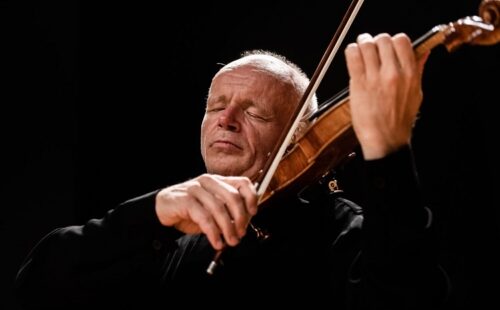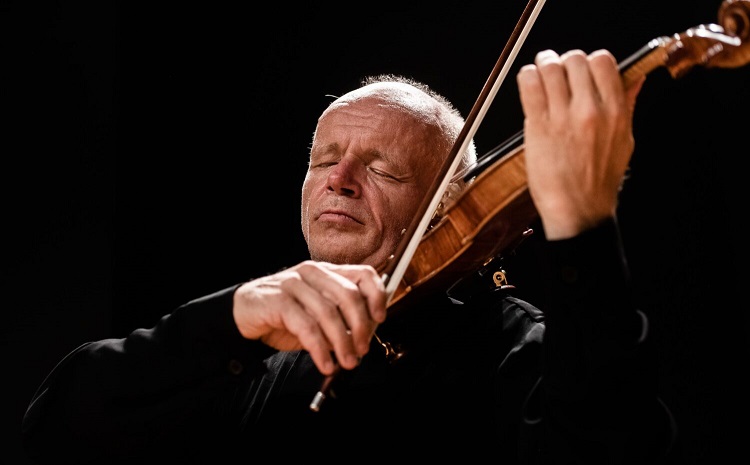 United Kingdom Bach, Mendelssohn, Mozart and Haydn: Scottish Chamber Orchestra / Thomas Zehetmair (soloist/conductor), City Halls, Glasgow, 15.10.2021. (GT)
United Kingdom Bach, Mendelssohn, Mozart and Haydn: Scottish Chamber Orchestra / Thomas Zehetmair (soloist/conductor), City Halls, Glasgow, 15.10.2021. (GT)

Bach – Violin Concerto in A minor, BWV 1041
Mozart (arr. by Zehetmair) – String Trio fragment K. Anhang 66
Mendelssohn – Overture, Die schöne Melusine, Op.32
Haydn – Symphony No.92 in G major ‘Oxford’ H 1/92
After eighteen months of watching live streaming and recordings it was a terrific feeling to be back in a concert hall listening to music with an audience present – regardless of the outstanding performance levels – nothing compares with sitting in a concert hall listening live to musicians. It was nice to see the familiar friendly faces both on and off stage – plus many welcome new faces – to enjoy this concert repertoire and the musicianship of one of Europe’s finest violinists in Thomas Zehetmair was an added bonus.
To begin with a concerto by Johann Sebastian Bach was entirely appropriate; the opening bars of the Allegro moderato were upbeat, and dazzlingly tuneful, melodic in true ritornello form, with the soloist playing heroically and quite gloriously. In the second movement, Andante, the mood was grand and elegiac particularly in a movingly beautiful solo passage, with a distinct ostinato pronounced throughout eliciting gorgeous playing from the whole ensemble. The finale, Allegro assai, was marvellously performed in a cheerily upbeat, yet fiery mood – as in a gigue – life-enhancing, vigorous and joyous.
For the brief Mozart arrangement by Zehetmair himself, the piece opened on the first violin of Cecilia Ziano, with the attractive bright idea picked up by the cello and viola as if in a quarrel, or more likely a friendly discourse between them, after a few bars the orchestra joined in the ‘conversation’ and this brief work proved a lively little piece, fascinatingly arranged by the Austrian maestro.
In Mendelssohn’s overture (Die schöne Melusine), the beautiful harmony expressed by flute, clarinet, and oboe flowed gracefully – in the opening flowing bars there was a hint of how Wagner’s Das Rheingold starts in the lithe arpeggios from the strings leading to a beautiful singing passage – bringing out all the vibrant colour of the piece, as one commentator wrote conjuring up ‘the dream-like world of harmonic power and the happiness and unhappiness of two beings’.
In Haydn’s ‘Oxford’ Symphony, the Adagio – Allegro spiritoso, opened on brightly graceful strings in G major, with the momentum assisted by a thump from the timpani and leading to some terrific playing in the transitions from minor to major, perhaps reprising Haydn’s jocularity of the earlier ‘London’ symphonies? There was some outstanding virtuosity from the oboe and bassoon.
There came classical elegance in the second movement, Adagio cantabile, notably in an idea expressed on the oboe of Robin Williams, which when it was picked up in the strings and other woodwind sounded almost heavenly but then ended by a dark menacing section and closed with delightfully enticing musicianship from the strings.
The third movement Menuetto: Allegretto was thundery in more jocular chatter with a marvellously played Trio section following the minuet – all of which highlighted the world-class virtuosity of this ensemble’s woodwind.
In the finale, Presto, we heard a daringly racy idea in G major on strings – all as if rushing to the close – with lovely playing on the first violins, wonderful flute playing by André Cebrián, and the dancing ideas now repeated but with three loud G major chords!
This was a tremendous climax to a concert packed with glorious music and some world-class playing.
Gregor Tassie
